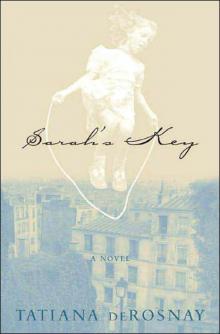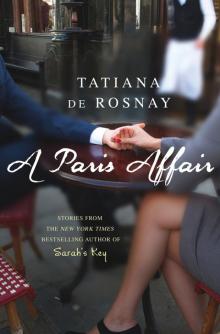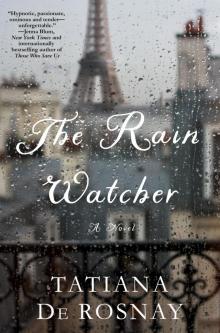- Home
- Tatiana de Rosnay
A Secret Kept
A Secret Kept Read online
A Secret Kept
Also by Tatiana de Rosnay
Sarah's Key
A Secret Kept
Tatiana de Rosnay
St. Martin's Press New York
Table of Contents
Title
Copyright
Dedication
A Secret Kept
Acknowledgments
This is a work of fiction. All of the characters, organizations, and events portrayed in this novel are either products of the author's imagination or are used fictitiously.
A SECRET KEPT. Copyright (c) 2009, 2010 by Tatiana de Rosnay. All rights reserved. Printed in the United States of America. For information, address St. Martin's Press, 175 Fifth Avenue, New York, N.Y. 10010.
www.stmartins.com
Library of Congress Cataloging-in-Publication Data
Rosnay, Tatiana de, 1961-
A secret kept / Tatiana de Rosnay. -- 1st ed.
p. cm.
ISBN 978-0-312-59331-5
1. Brothers and sisters--Fiction. 2. Family secrets--Fiction. 3. Noirmoutier Island (France)--Fiction. 4. Psychological fiction. I. Title.
PR9105.9.R66S43 2010
823'.914--dc22
2010022062
First published under the title Boomerang in France by Editions Heloise d'Ormesson
First U.S. Edition: September 2010
10 9 8 7 6 5 4 3 2 1
This book is for
Cecilia and Alexis, my wonderful sister and brother,
and for Cedric and Caroline, their loved ones.
In loving memory of Pierre-Emmanuel (1989-2006)
Let my name be ever the household word that it always was.
Let it be spoken without an effort, without the ghost of a shadow upon it.
--HENRY SCOTT HOLLAND
"Manderley was no more."
--DAPHNE DU MAURIER, Rebecca
A Secret Kept
I am shown into a small, drab room, told to sit down and wait. Six empty brown plastic chairs face each other on tired linoleum. In a corner, a fake green plant, shiny leaves coated with dust. I do as I am told. I sit down. My thighs tremble. My palms feel clammy, my throat parched. My head throbs. I think, I should call our father now, I should call him before it gets too late. But my hand makes no effort to grab the phone in the pocket of my jeans. Call our father and tell him what? Tell him how?
The lighting is harsh, glaring strips of neon barring the ceiling. The walls are yellowish and cracked. I sit there, numb. Helpless. Lost. I long for a cigarette. I wonder if I am going to retch, bring up the bitter coffee and stale brioche I had a couple of hours ago.
I can still hear the screech of the wheels, feel the sudden lurch of the car as it veered sharply to the right, careening into the railing. And her scream. I can still hear her scream.
How many people have waited here? I think. How many people have sat where I am sitting now and waited for news of their loved ones? I cannot help imagining what these jaundiced walls have seen. What they know. What they remember. Tears, shouts, or relief. Hope, pain, or joy.
The minutes click by. I watch the round face of a grimy clock above the door. There is nothing else for me to do but wait.
After half an hour or so, a nurse comes in. She has a long, horsey face, skinny white arms.
"Monsieur Rey?"
"Yes," I say, my heart in my mouth.
"You need to fill out these papers. With her details."
She hands me a couple of sheets and a pen.
"Is she all right?" I mumble.
My voice seems thin and strained.
She flickers watery, lashless eyes over me.
"The doctor will tell you. The doctor will come."
She leaves. She has a sad, flat ass.
I spread the sheets of paper over my knees with trembling fingers.
Name, birth date and place, marital status, address, social security number, health insurance number. My hand still shakes as I print out "Melanie Rey, born August 15, 1967, at Boulogne-Billancourt, single, 49 rue de la Roquette, Paris 75011."
I have no idea what my sister's social security number is. Or her health insurance number for that matter. All that stuff must be in her bag. Where is her bag? I can't remember anything about her bag. Just the way her body slumped forward when they hauled her out of the car. The way her limp arms hung down to the ground from the stretcher. And there I was, not a hair out of place, not a bruise on my skin, and I had been sitting right next to her. I flinch. I keep thinking I am going to wake up.
The nurse comes back with a glass of water. I gulp it down. It has a metallic, stale taste. I thank her. I tell her I don't have Melanie's social security number. She nods, takes the sheets, and leaves.
The minutes inch by. The room is silent. It is a small hospital. A small town, I guess. In the suburbs of Nantes. I'm not quite sure where. I stink. No air-conditioning. I can smell the sweat trickling under my armpits, gathering around my groin. The sweaty, meaty smell of despair and panic. My head still throbs. I try breathing calmly. I manage to do this for a couple of minutes. Then the helpless, awful feeling takes over and swamps me.
Paris is more than three hours away. I wonder again if I should call my father. I tell myself I need to wait. I don't even know what the doctor has to say. I glance down at my watch. Ten thirty. Where would our father be now? I wonder. At some dinner party? Or watching cable TV in his study, with Regine in the next room, on the phone, painting her nails?
I decide to wait a little longer. I am tempted to call my ex-wife. Astrid's name is still the first one that pops up in times of stress or despair. But the thought of her with Serge, in Malakoff, in our old house, in our old bed, with him invariably answering the phone, even her mobile, for Christ's sake--"Oh, hi, Antoine, what's up, man?"--is just too much. So I don't call Astrid, although I long to.
I stay in the small, stuffy room and try once more to remain calm. Try to stop the panic rising within me. I think of my kids. Arno in all his teenage glory and rebellion. Margaux, a creature of mystery at fourteen. Lucas, still a baby at eleven, compared with the other two and their raging hormones. I simply cannot imagine myself telling them, "Your aunt is dead. Melanie is dead. My sister is dead." The words make no sense. I push them away.
Another hour creeps by. I sit there, my head in my hands. I try to sort out the mess building up in my mind. I start thinking about the deadlines I need to keep. Tomorrow is Monday, and after this long weekend, there are many urgent things to be done--that unpleasant Rabagny and his god-awful day-care center I should not have taken on; Florence, that hopeless assistant I know I have to fire. But how can I possibly think of this? I realize, appalled at myself. How can I think of my job now, at this precise moment when Melanie is somewhere between life and death? I say to myself with a sinking heart, Why Melanie? Why her? Why not me? This trip had been my idea. My present for her birthday. That fortieth birthday she was so upset about.
A woman of my age comes in at last. A green operating blouse and one of those funny little paper hats surgeons wear. Shrewd hazel eyes, short chestnut hair touched with silver. She smiles. My heart leaps. I rush to my feet.
"That was a close call, Monsieur Rey," she says.
I notice small brown stains on the front of her uniform. I wonder with dread whether those stains are Melanie's blood.
"Your sister is going to be all right."
To my horror, my face crumples up, tears spill out. My nose runs. I am acutely embarrassed to be crying in front of this woman, but I can't prevent it.
"It's okay," the doctor says. She grips my arm. She has small, square hands. She pushes me back down into the chair, sits beside me. I bawl the way I used to when I was a kid, deep sobs that come from the gut.
I nod, try to tidy up my damp nostrils with the back of my hand.
"We know she wasn't drinking. We checked that. Can you tell me what happened?"
I manage to repeat what I told the police and the ambulance people earlier on. That my sister wanted to drive the rest of the way home. That she was a reliable driver. That I had never been nervous with her at the wheel.
"Did she black out?" asks the doctor. The name on her badge reads: DR. BENEDICTE BESSON.
"No, she didn't."
And then it comes back to me. Something I had not told the ambulance people, because I only remember it just now.
I look down at the doctor's small, tanned face. My own face is still twitching with the crying. I catch my breath.
"My sister was in the middle of telling me something. . . . She turned to me. And then it happened. The car drove off the highway. It happened so fast."
The doctor urges me on.
"What was she telling you?"
Melanie's eyes. Her hands clasping the wheel. Antoine, there's something I need to say. I've kept it back all day. Last night, at the hotel, I remembered something. Something about . . . Her eyes, troubled, worried. And then the car driving off the road.
She fell asleep as soon as they were able to make their way through the sluggish suburban gridlock that circled Paris. Antoine smiled as her head dropped back against the car window. Her mouth opened, and he thought he heard a tiny snore. She had been irritable that morning when he came to pick her up just after dawn. She hated surprises and always had. He knew that, didn't he? Why the hell was he organizing a surprise trip? Honestly! Wasn't it bad enough turning forty? Getting over an agonizing breakup? Never having been married, not having any kids, and people mentioning biological clocks every five minutes? "If somebody utters that word one more time, I'll hit them," she hissed between gritted teeth. But the idea of facing the long weekend alone was unbearable for her. He knew that. He knew she couldn't stand thinking about her hot, empty apartment above the noisy rue de la Roquette, and all her friends out of town leaving joyful messages on her voice mail: "Hey, Mel, you're forty!" Forty. He glanced across at her. Melanie, his little sister, was going to be forty. He couldn't quite believe it. Which made him forty-three. He couldn't quite believe that either.
Yet the crinkled eyes in the rearview mirror were those of a man in early middle age. Thick salt-and-pepper hair, a long, lean face. He noticed that Melanie dyed her hair brown. Her roots were unmistakably gray. There was something touching about her dyeing her hair. Why? he mused. So many women dyed their hair. Maybe it was because she was his kid sister. He simply could not imagine her growing old. Her face was still lovely. Perhaps it was even lovelier than it had been in her twenties or thirties, because her bone structure had such class. He never tired of gazing at Melanie. Everything about her was small, feminine, delicate. Everything about her--the dark green eyes, the beautiful curve of a nose, the startling white smile, the slim wrists and ankles--reminded him of their mother. She didn't like being told that she looked like Clarisse. She had never liked it. But to Antoine it was like their mother peeping out from Melanie's eyes.
The Peugeot gathered speed, and Antoine guessed they'd probably be there in less than four hours. They had left early enough to beat the traffic. Despite her questions, he hadn't breathed a word about their destination. He had just grinned. "Pack enough for a couple of days. We're going to celebrate your birthday in style."
There had been a minor problem with Astrid, his ex-wife. A little smoothing out to do. That long weekend was normally "his." The kids were supposed to be leaving Astrid's parents' place in the Dordogne to come to him. He had been firm on the phone. It was Mel's birthday, she was forty, he wanted to make it special for her, she still wasn't over Olivier, she was going through a bad patch. Astrid's voice: "Oh, merde, Antoine. I've had the kids for the past two weeks. Serge and I really need some time for ourselves."
Serge. Even the mere name made him cringe. A photographer in his early thirties. The muscular, rugged outdoor type. He specialized in food. Natures mortes for luxurious cookbooks. He spent hours trying to get pasta to glisten, veal to look savory, fruit to look luscious. Serge. Every time Antoine shook his hand when he came to pick up the children, he was confronted with the hideous recollection of Astrid's digital camera and what he had discovered in its memory card while she was out shopping that fateful Saturday. At first, puzzled, he had seen only a pair of hairy buttocks clenching and unclenching. And then he had realized with horror that the buttocks were actually pumping a penis into what looked extraordinarily like Astrid's body. That was how he had found out. He had confronted Astrid, laden with shopping bags, on that doomed Saturday afternoon, and she had burst into tears and admitted that she loved Serge, that the affair had been going on ever since that trip to Turkey with the kids, and that she felt so relieved that he now knew.
Antoine felt tempted to light a cigarette to ward off unpleasant memories. But he knew the smoke would wake his sister and she would make some cantankerous comment about his "filthy habit." Instead, he concentrated on the highway opening up before him.
Astrid still felt guilty about Serge--he felt it--about how he, Antoine, had found out about their affair. About the divorce. About the aftermath of it all. And she loved Melanie dearly. They had been friends for a long time, and they worked in the same field, publishing. She hadn't had the heart to say no. Astrid had sighed, "Okay, then. The kids can come to you later. Give Mel a hell of a birthday."
When Antoine stopped at a gas station for a refill, Melanie at last yawned and rolled the car window down.
"He, Tonio," she drawled, "where the hell are we?"
"You really have no idea?"
She shrugged.
"Nope."
"You've been asleep for the past two hours."
"Well, you did turn up at dawn, you bastard."
After a quick coffee (for her) and a quick cigarette (for him), they got back into the car. She seemed less petulant, Antoine noticed.
"It's cute of you to do this," she said.
"Thanks."
"You're a cute brother."
"I know."
"You didn't have to. Maybe you had other plans?"
"No other plans."
"Like a girlfriend?"
He sighed.
"No girlfriend."
The thought of his recent affairs made him want to stop the car, get out, and weep. Since the divorce there had been a string of women. And a string of disillusion. Women he had met via the Internet on those infamous websites. Women of his age, married women, divorced women, younger women. He had thrown himself into the dating process with gusto, determined to find it exhilarating. But after the first couple of sexually acrobatic stunts, coming back heavy-hearted and drained to his new empty apartment and his new empty bed, he found the truth staring him in the face. He had shied away from it long enough. He still loved Astrid. He had finally admitted that to himself. He still loved his ex-wife. He loved her so desperately it made him feel sick to his stomach.
Melanie was saying, "Probably had better, more exciting things to do than to take your spinster of a sister on a long weekend."
"Don't be silly, Mel. This is what I want to do. I want to do this for you."
She glanced at a signpost on the highway.
"Hey, we're heading west!"
"Clever girl!"
"What's west?" she asked, ignoring the affectionate irony in his voice.
"Think," he said.
"Um, Normandy? Brittany? Vendee?"
"You're on the right track."
She said nothing, listening to the old Beatles CD Antoine had turned on. As they drove on, she uttered a little scream. "I know! You're taking me to Noirmoutier!"
"Bingo," he said.
But her face had sobered up. She looked down at her hands in her lap, her lips tightening.
"What's wrong?" he said, concerned. He had been expecti
ng laughter, whoops, smiles, anything but her static face.
"I haven't been back there."
"So?" he said. "Neither have I."
"It's been"--she paused to count on her slim fingers--"1973, right? It's been thirty-four years. I won't remember a thing! I was six years old."
Antoine slowed the car.
"It doesn't matter. It's just, you know, to celebrate your birthday. We did your sixth birthday there, remember?"
"No," she said slowly. "I don't remember a thing about Noirmoutier."
She must have realized that she was acting like a spoiled child, because she swiftly put a hand on her brother's arm.
"Oh, but it doesn't matter, Tonio. I'm happy. I am, really. And the weather is beautiful. It's so nice to be alone with you and to get away from everything!"
By "everything," Antoine knew she meant Olivier and the wreckage their breakup had left behind. And her fiercely competitive job as a publisher at one of France's most famous publishing companies.
"I booked us into the Hotel Saint-Pierre. You remember that, don't you?"
"Yes!" she exclaimed. "Yes, I do! The old, lovely hotel in the woods! With Grand-pere and Grand-mere . . . Oh, God, so long ago . . ."
The Beatles sang on. Melanie hummed along. Antoine felt relieved, at peace. She liked his surprise. She was happy to go back. But one little thing niggled at him. One little thing he hadn't taken into account when the idea of going back had occurred to him.
Noirmoutier 1973 had been their last summer with Clarisse.
Why Noirmoutier? he wondered as the car sped on and Melanie hummed to "Let It Be." He had never considered himself a nostalgic person. He had never looked back. But since his divorce he had changed. Relentlessly he had found himself thinking more about the past than the present or the future. The weight of the past year, his first year alone, that dreary, solitary year, had sparked off pangs of regret, longing for his childhood, striving for happy memories. That was how the island had come back to him, timidly at first, then more powerfully and more precisely as the memories came tumbling in like mail gathering in a box.
-->

 A Secret Kept
A Secret Kept Sarah's Key
Sarah's Key A Paris Affair
A Paris Affair The Other Story
The Other Story The House I Loved
The House I Loved The Rain Watcher
The Rain Watcher